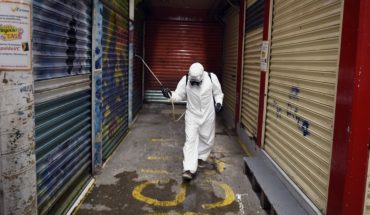To the World Cup fever was added the camel virus. Hundreds of fans, athletes and journalists in Doha, Qatar, have begun to feel cold symptoms and discomfort in recent weeks. The disease became known when it was confirmed that two players from France were infected and missed the match against Morocco, for the semifinal of the Qatar 2022 World Cup. In addition, this Thursday it was confirmed that Dayot Upamecano and Adrien Rabiot were joined by Kingsley Coman among the sick French footballers. Specialists explained that in this context special attention should be paid to fever, breathing difficulties, vomiting, cough and diarrhea. All of these symptoms of MERS-CoV, popularly known as “camel flu”. What is the camel virus and its origin”MERS is caused by a coronavirus, there were many cases in 2013 and then half was controlled, it did not bother anymore, but it continues. Yes, they originate from camels. I think it is not to be scared, always infectologists are aware when there is a patient traveling, it is logical, one takes into account the infections of the place, the famous travel medicine. But I don’t think it’s an issue that should cause concern,” infectologist Lautaro de Vedia told Infobae.Middle East Respiratory Syndrome (MERS) is a viral respiratory disease caused by one of the coronaviruses (MERS-CoV), but differs from the new coronavirus SARS-CoV-2, which is the cause of COVID-19 infection. Both viruses differ in terms of the source of infection, the mode of transmission, and the severity of the disease. In 2012, MERS first isolated the virus from a 60-year-old patient in Saudi Arabia who had acute pneumonia and severe kidney failure. From 2012 to July 2017, 2,040 cases had been reported. It affected men more than women, with a mortality rate close to 35%. How the virus is transmittedMERS-CoV, being a zoonotic virus, is transmitted from animals to people. Studies have shown that humans become infected through direct or indirect contact with infected dromedaries, although the exact route of transmission is not yet well understood. Human-to-human transmission is also possible. The largest outbreaks occurred in health facilities in Saudi Arabia, the United Arab Emirates and the Republic of Korea. Currently, WHO explained, no vaccine or specific treatment is available, although several MERS-CoV vaccines and specific treatments are in clinical development.” As a general precaution, anyone visiting farms, markets, stables or other places where dromedaries and other animals are present should take general hygiene measures, such as washing hands frequently, before and after touching animals, and avoiding contact with sick animals. The consumption of raw or undercooked animal products, including milk and meat, carries a high risk of infection by various pathogens that can cause disease in humans. Animal products that are properly processed by cooking or pasteurization are safe for consumption, but they must also be handled with care to avoid cross-contamination with raw foods. Camel meat and milk are nutritious products that can continue to be consumed after pasteurization, cooking or other heat treatments,” they said.
Camel virus concern: outbreaks could follow Qatar 2022 World Cup
December 17, 2022 |




![translated from Spanish: [VIDEO] Elton John loses his voice and tears a concert in half in New Zealand translated from Spanish: [VIDEO] Elton John loses his voice and tears a concert in half in New Zealand](https://ananoticias.com/wp-content/uploads/2020/02/translated-from-Spanish-VIDEO-Elton-John-loses-his-voice-and-370x215.jpg)
